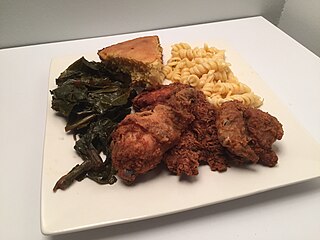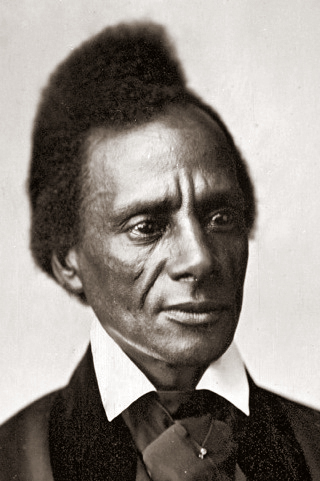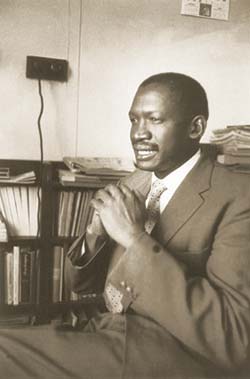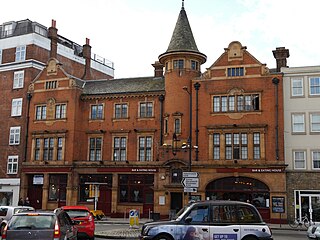Related Research Articles

Soul food is the ethnic cuisine of African Americans. Originating in the American South from the cuisines of enslaved Africans transported from Africa through the Atlantic slave trade, soul food is closely associated with the cuisine of the Southern United States. The expression "soul food" originated in the mid-1960s when "soul" was a common word used to describe African-American culture. Soul food uses cooking techniques and ingredients from West African, Central African, Western European, and Indigenous cuisine of the Americas.

Soweto is a township of the City of Johannesburg Metropolitan Municipality in Gauteng, South Africa, bordering the city's mining belt in the south. Its name is an English syllabic abbreviation for South Western Townships. Formerly a separate municipality, it is now incorporated in the City of Johannesburg Metropolitan Municipality and is one of the suburbs of Johannesburg.

Lovebird is the common name for the genus Agapornis, a small group of parrots in the Old World parrot family Psittaculidae. Of the nine species in the genus, all are native to the African continent, with the grey-headed lovebird being native to the African island of Madagascar.

The University of the Witwatersrand, Johannesburg, commonly known as Wits University or Wits, is a multi-campus public research university situated in the northern areas of central Johannesburg, South Africa. The university has its roots in the mining industry, as do Johannesburg and the Witwatersrand in general. Founded in 1896 as the South African School of Mines in Kimberley, it is the third oldest South African university in continuous operation.

Charles Lenox Remond was an American orator, activist and abolitionist based in Massachusetts. He lectured against slavery across the Northeast, and in 1840 traveled to the British Isles on a tour with William Lloyd Garrison. During the American Civil War, he recruited blacks for the United States Colored Troops, helping staff the first two units sent from Massachusetts. From a large family of African-American entrepreneurs, he was the brother of Sarah Parker Remond, also a lecturer against slavery.

Robert Mangaliso Sobukwe OMSG was a South African anti-apartheid revolutionary and founding member of the Pan Africanist Congress (PAC), serving as the first president of the organization.

Catering is the business of providing food services at a remote site or a site such as a hotel, hospital, pub, aircraft, cruise ship, park, festival, filming location or film studio.
Dobsonville is a township in greater Soweto, Johannesburg, South Africa. It lies to the west of Meadowlands, a part of Diepmeadow, and is adjacent to Mofolo North and Zondi, which are suburbs of Soweto on its southern border.

Witbank, officially eMalahleni, is a city situated on the Highveld of Mpumalanga, South Africa, within the Emalahleni Local Municipality. The name Witbank is Afrikaans for "white ridge", and is named after a white sandstone outcrop where wagon transport drivers rested. The city is known for its coal-mining in the surrounding region.

South Street in Philadelphia, originally named Cedar Street in William Penn's original street grid, is an east–west street forming the southern border of Center City and the northern border for South Philadelphia in Pennsylvania, United States.
Shalom bayit is the Jewish religious concept of domestic harmony and good relations between husband and wife. In a Jewish court of law, shalom bayit is the Hebrew term for marital reconciliation.

William Best, known professionally as Willie Best or Sleep 'n' Eat, was an American television and film actor.

Andres "Dres" Vargas-Titus is an American hip hop artist. He is known for being the lead rapper of the alternative hip hop duo Black Sheep, before recording as a solo artist.

Anchieta's sunbird is a species of bird in the family Nectariniidae. It is found in Angola, the DRC, Malawi, Mozambique, Tanzania, and Zambia, and is named after José Alberto de Oliveira Anchieta.
The Wits Theatre Complex is a performing arts complex in Braamfontein, a suburb of Johannesburg, South Africa. It is part of the University of the Witwatersrand, although it also caters for professional companies, dance studios and schools. It is run by the University's Performing Arts Administration (PAA).

The campuses of the University of the Witwatersrand, Johannesburg contain a number of notable buildings. There are five campuses: East Campus and West Campus are located in Braamfontein on opposite sides of the M1 highway, while the Education Campus and the Medical and Management schools are located in Parktown.

The King's Head is a Grade II listed public house at 4 Fulham High Street, Fulham, London.

Dr. Xuma's house was one of two houses to escape the destruction of Sophiatown, South Africa by the government in the late 1950s, it is also a landmark which belonged to Dr Alfred Bitini Xuma who was a medical doctor and the President of the African National Congress (ANC) and Chairperson of the Western Areas Anti-Expropriation and Proper Housing Committee. Construction of the house was completed in 1935 and named Empilweni which roughly translates to "the place of life". Xuma and his second wife Madie Hall Xuma lived there until his own property was expropriated when Sophiatown was declared a White area in terms of the Native Resettlement Act of 1954, and he had vacated it by 1957.
The Hotel and Restaurant Workers' Union (HARWU) was a trade union representing hospitality workers in South Africa.

Everybody Eats PDX was a soul food restaurant in Portland, Oregon. The business closed in 2022.
References
- ↑ Unknown [ permanent dead link ]
- ↑ "Research Archives, University of the Witwatersrand, South Africa - WITS" (PDF). www.historicalpapers.wits.ac.za. Retrieved 2025-01-01.
- ↑ "Google".